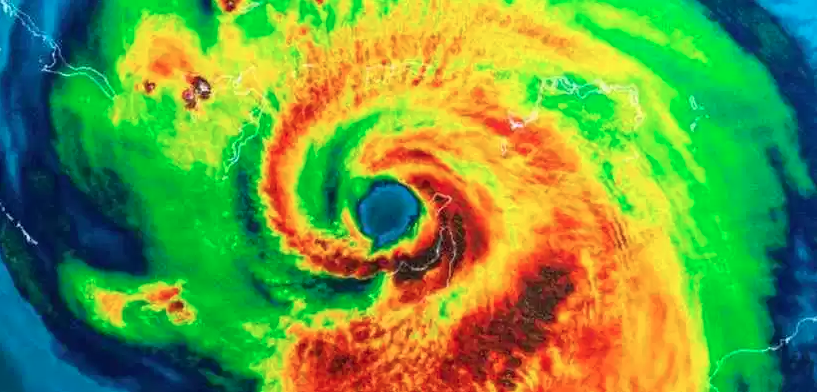NOAA and NASA Warns 5G
Technology Will Disrupt
Weather Prediction
by Jim Satney
Prepare For Change
Scientists and the National Oceanic and Atmospheric Administration (NOAA) are claiming that 5G wireless technology will interrupt weather satellite imagery. If their claims are true, the interruptions would disrupt the core component used to predict the weather; thus, greatly reducing our capacity to predict major weather events more than a few days out. This could have dire consequences on our economy, considering how reliant modern society is on having prediction models serve to warn communities of incoming large-scale storms. The issue is being raised during a time where some lawmakers and communities are questioning the health risks associated with 5G technology.
Neil Jacobs, head of the NOAA, explained to Congress last week that 5G wireless could disrupt weather prediction so dramatically that it would set us back four decades.
“If you looked back in time to see when our forecast skill was 30 percent less than today, it’s somewhere around 1980. This would result in the reduction of hurricane track forecast lead time by roughly 2 to 3 days,” he said.
And it isn’t just Jacobs warning of potential negative fallout with interrupted weather prediction technology. NASA’s Jim Bridenstine says that 5G technology will rattle our ability to predict dangerous hurricane paths, which will leave many communities exposed to increased loss of property and life.
“That part of the electromagnetic spectrum is necessary to make predictions as to where a hurricane is going to make landfall,” he told the committee. “If you can’t make that prediction accurately, then you end up not evacuating the right people and/or you evacuate people that don’t need to evacuate, which is a problem.”
Commerce Secretary Wilbur Ross, alongside Bridenstine, sent a warning letter to FCC Chairman Ajit Pai and requested a forum to speak over the issue.
Pai rejected the meeting claiming there is no “technical basis for an objection.”
Two weeks later, the FCC began auctioning off the 24GHz spectrum.
Two senators, Maria Cantwell (D-WA) and Ron Wyden (D-OR) issued concern to Pai as well.
To continue down the path the FCC is currently on, to continue to ignore the serious alarms the scientific community is raising, could lead to dangerous impacts to American national security, to American industries, and to the American people,” they said.
The two senators asked Pai to not issue any more 24GHz licenses or allow any telecommunication companies to utilize 24GHz frequency until weather prediction satellites can function properly under 5G conditions.
But the wireless industry and FCC are fighting back. They say there is no basis for the claims.
“It’s an absurd claim with no science behind it,” wrote Brad Gillen, CTIA’s executive vice president, stated in his own personal retort.
“We are risking our 5G leadership over protecting mothballed decade-old government systems,” he continued to scold.
Jordan Gerth, an atmospheric scientist at the University of Wisconsin at Madison says that Gillen’s statement is “misleading.” Gerth says that microwave sensors used to read water vapor data are easy to interfere with.
Dear @CTIA, I'd like to introduce you to the Advanced Technology Microwave Sounder (ATMS), a real instrument in flight right now with a sensing band at 23.8 GHz. Sure, NPOESS was cancelled but JPSS is the backbone of US-world space observing. #FactsMatter https://t.co/uQ5UozWSiw
— Jordan Gerth (@jjgerth) May 22, 2019
The issue comes down to two frequencies that won’t play well together (at least, according to who you may believe). The microwave sensors rely on 23.8 gigahertz frequency. The FCC is auctioning off 24 gigahertz bands.
The NOAA’s position is that the two bands will interfere with one another making water vapor data unreliable. Without water vapor data, there is no good way to predict the weather.

photo credit: AMS Weather Book
“If you look back in time to see when our forecast skill was roughly 30 percent less than it was today, it’s somewhere around 1980,″ Jacobs said while testifying before the House Science Committee.
What does a reduction mean for hurricane survival?
Jacobs says that the reduction means that Hurricane Sandy would never have been predicted by the European Model.
“The assessments that NASA has done in conjunction with NOAA have determined that … there is a very high probability that we are going to lose a lot of data,” NASA’s administrator, Jim Bridenstine, told the House Science Committee.
Even the Navy is issuing concerns over 5G technology disruptions and weather prediction models, saying it will result in “a probable degradation of weather and ocean models” and “increased risk of … degraded battlespace awareness for tactical/operational advantage.”
5G Health Risks a National Concern
The NOAA and Nasa’s scrutiny over 5G technology comes on the heels of an outpouring of national criticism over 5G health concerns. Parents in California recently got Sprint to shut down a 5G tower, claiming the tower was causing children’s cancer. Residents in Rhode Island claim the city is quietly installing 5G devices on lamp posts and street lights. Vermont lawmakers intend to amend a 5G bill due to health concerns. The country of Switzerland assembled a 5G monitoring group that discloses its findings to citizens. Portland’s mayor is attempting to block 5G tower installs around the area.
In other words, the 5G battle seems to just be getting started.
___
https://prepforthat.com/noaa-nasa-warns-5g-technology-will-disrupt-weather-prediction/

